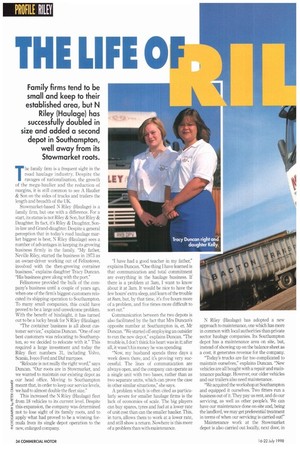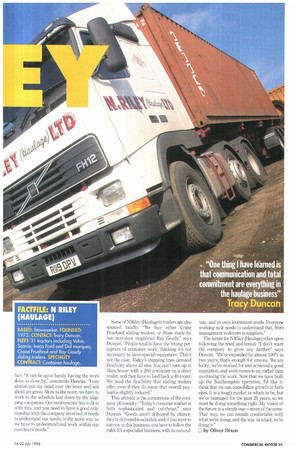PROFILE RILEY
Page 46

Page 47

If you've noticed an error in this article please click here to report it so we can fix it.
Family firms tend to be small and keep to their established area, but N Riley (Haulage) has successfully doubled in size and added a second depot in Southampton, well away from its Stowmarket roots.
The family firm is a frequent sight in the road haulage industry. Despite the ravages of nationalisation, the growth if the mega-haulier and the reduction of margins, it is still common to see A Haulier & Son on the sides of trucks and trailers the length and breadth of the UK.
Stowmarket-based N Riley (Haulage) is a family firm, but one with a difference. For a start, its status is not Riley & Son, but Riley & Daughter. In fact. it's Riley & Daughter, Sonin-law and Grand-daughter. Despite a general perception that in today's road haulage market biggest is best, N Riley (Haulage) sees a number of advantages in keeping its growing business firmly in the family. "My father, Neville Riley, started the business in 1973 as an owner-driver working out of Felixstowe, involved with the then-growing container business," explains daughter Tracy Duncan, "His business grew along with the port."
Felixstowe provided the bulk of the company's business until a couple of years ago, when one of the firm's biggest customers relocated its shipping operation to Southampton. To many small companies, this could have proved to be a large and unwelcome problem. With the benefit of hindsight, it has turned out to be a lucky break for N Riley (Haulage).
"The container business is all about customer service," explains Duncan. "One of our best customers was relocating to Southampton, so we decided to relocate with it." This required a large investment and today the Riley fleet numbers 31, including Volvo, Scania, Iveco Ford and Daf marques.
"Relocate is not really the right word," says Duncan. "Our roots are in Stowmarket. and we wanted to maintain our existing depot as ,. our head office. Moving to Southampton i meant that, in order to keep our service levels. f.; we had to almost double the fleet size."
Eti This increased the N Riley (Haulage) fleet t °;., from 18 vehicles to its current level. Despite fthis expansion, the company was determined not to lose sight of its family roots, and to 8 apply what had proved to be a winning for15 mula from its single depot operation to the E new, enlarged company. "I have had a good teacher in my father," explains Duncan. "One thing I have learned is that communication and total commitment are everything in the haulage business. If there is a problem at 3am, I want to know about it at 3am. It would be nice to have the few hours' extra sleep, and learn of the trouble at 8am, but, by that time, it's five hours more of a problem, and five times more difficult to sort out."
Communication between the two depots is also facilitated by the fact that Mrs Duncan's opposite number at Southampton is, er, Mr Duncan. 'We started off employing an outsider to run the new depot." explains Duncan. "The trouble is, I don't think his heart was in it; after all, it wasn't his money he was spending.
"Now, my husband spends three days a week down there, and it's proving very successful, The lines of communication are always open, and the company can operate as a single unit with two bases, rather than as two separate units, which can prove the case in other similar situations," she says.
A problem which is often cited as particularly severe for smaller haulage firms is the lack of economies of scale. The big players can buy spares, tyres and fuel at a lower rate of unit cost than can the smaller haulier. This, in turn, allows them to work at a lower rate, and still show a return. Nowhere is this more of a problem than with maintenance. N Riley (Haulage) has adopted a new approach to maintenance, one which has more in common with local authorities than private sector haulage companies. Its Southampton depot has a maintenance area on site, but, instead of showing up on the balance sheet as a cost, it generates revenue for the company.
"Today's trucks are far too complicated to maintain ourselves," explains Duncan. "New vehicles are all bought with a repair and maintenance package. However, our older vehicles and our trailers also need maintenance.
"We acquired the workshop at Southampton and equipped it ourselves. Two fitters run a business out of it. They pay us rent, and do our servicing, as well as other people's. We can have our maintenance done on-site and, being the landlord, we may get preferential treatment in terms of when our servicing is carried out!"
Maintenance work at the Stowmarket depot is also carried out locally, next door, in fact. "It can be quite handy having the work done so close by," comments Duncan. "I can almost put my head over the fence and ask about progress. More to the point, we have to work to the schedule laid down by the shipping companies. Our maintenance has to fit in with this, and you need to have a good relationship with the company involved; it needs to understand our needs, in the same way as we have to understand and work within our customers' needs." Some of N Riley (Haulage)'s trailers are also sourced locally: "We buy either Crane Fruehauf sliding trailers, or those made by our next-door neighbour Ray Goudy," says Duncan. "People tend to have the wrong perception of container work, thinking it's not necessary to have special equipment. That's not the case. Today's shipping lines demand flexibility above all else. You can't turn up in Manchester with a 20ft container on a short trailer, and then have to load back a 40-footer. We need the flexibility that sliding trailers offer, even if they do mean that overall payload is slightly reduced."
This attitude is the cornerstone of the company philosophy: "Today's container market is both sophisticated and cut-throat," says Duncan. "Goods aren't delivered by chance; they're delivered to schedule and, if you want to survive in this business, you have to follow the rules. It's a specialist business, with its own cul
ture, and its own investment needs. Everyone working in it needs to understand that, from management to drivers to suppliers."
The future for N Riley (Haulage) relies upon following the tried and tested. "I don't want the company to grow any further," says Duncan. "We've expanded by almost 100% in two years; that's enough for anyone. We are lucky: we've worked for and achieved a good reputation, and work comes to us, rather than us chasing the work. Now that we have built up the Southampton operation, I'd like to think that we can consolidate growth at both sites. It is a tough market in which to be, but we've managed for the past 25 years, so we must be doing something right. My vision of the future is a simple one —more of the same. That way, we can remain comfortable with what we're doing, and the way in which we're doing it."
E by Oliver Dixon FACTFILE: N RILEY (HAULAGE) BASED: Stowmarket. FOUNDED: 1973. CONTACT: Tracy Duncan. FLEET: 31 tractors including Volvo, Scania, Iveco Ford and Daf morgues; Crane Fruehauf and Ray Goudy sliding trailers. SPECIALITY CONTRACT: Container haulage
















































































































